Calcium has been known for centuries to help the human body grow and maintain strong bones, keep a healthy nervous system, and a have a myriad of other health benefits (1, 2).
It’s so important to your normal functioning that if you don’t receive adequate amounts from your diet or supplementation, your body will leech it from your bones to use elsewhere, weakening your skeletal system and increasing your risk of fractures.
Best Calcium
1. Citracal Calcium +D3 Slow Release
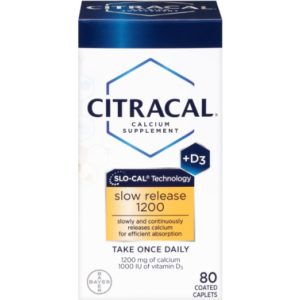
Citracal Calcium + D3 Slow Release is our number one pick and combines several key elements of an effective supplement into one product. It is a simplistic, cost-effective, and science-based approach that makes it stand out from its competitors in all the ways that matter.
Though it uses a binder to address this concern, they do so with a plant-based compound which turns into a gel when it comes in to contact with water causing the slow-release action. They also provide both calcium citrate and calcium carbonate along with 1000 IU of vitamin D, and 80 mg of magnesium. For these reasons, it’s our #1 pick.
2. Kirkland Signature Calcium Citrate Magnesium and Zinc
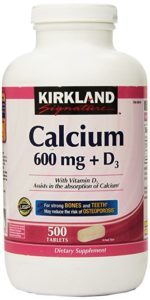
While Kirkland manages to provide an adequate amount of calcium alongside magnesium and zinc, it also manages to do so while giving you the most for your money.In terms of vitamin and mineral formulation, Kirkland Signature Calcium provides 250 mg of calcium, 40 mg of magnesium, and 5 mg of zinc.
Though the recommended daily dose of calcium is 1000 mg per day, each bottle comes with 500 tablets, which will allow for more substantial use over a greater time.
3. Bluebonnet Calcium Citrate and Vitamin D3

With very few extra ingredients, Bluebonnet Calcium Citrate manages to provide the daily recommended amount of calcium and vitamin D3 while eliminating unnecessary additions. Each tablet contains 250 mg of calcium, 200 IU of vitamin D, and 100 mg of magnesium.
This formulation comes with only five additional ingredients to bind the tablets for use and serves to take care of most calcium needs.
4. New Chapter Bone Strength Calcium
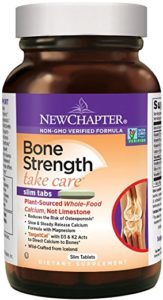
New Chapter Bone Strength Calcium is one of the few calcium supplements derived from algae instead of traditional calcium citrate or calcium carbonate. It is also 100% vegetarian, Kosher, and certified gluten-free making it effective for multiple lifestyle preferences.
Each tablet comes with 257 mg of calcium as well as 33 IU of vitamin D allowing you to get a decent amount of each vitamin per serving.
5. Nature Made Calcium
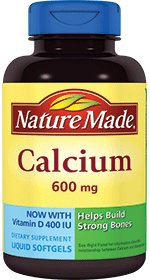
Each tablet contains 600 mg of calcium and 400 IU of vitamin D. Similar to Citracal, Nature Made’s supplement also has a slow-release element that allows for this higher dosage amount. This gives you more for your money and prevents the need for frequent doses throughout the day.
Nature Made also comes in a capsule form for those who may not be fond of tablets. The capsule is animal-based, however, so this is a drawback for those who prefer a vegan or vegetarian option
6. Solaray Calcium Magnesium Zinc
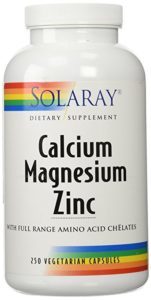
Though Solaray’s calcium supplement does provide a standard 250 mg of calcium, 125 mg of magnesium, and 6 g of zinc, it does so through multiple sources.
The lack of medical studies did place this supplement further down on our list.
7. Amazing Formulas Calcium Magnesium Zinc +
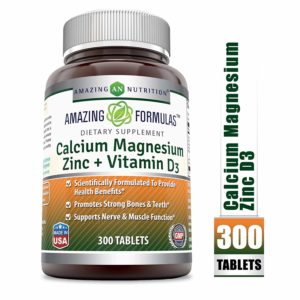
With approximately 333 mg of calcium per serving, Amazing Formulas provides a formulation that should be an ideal fit for most people looking to increase their calcium intake. Alongside the traditional calcium, each dose provides 133 mg of magnesium, 8 mg of zinc and 200 IU of vitamin making this a well-rounded supplement choice.
Additionally, Amazing Formulas also uses very few additional ingredients to provide its formulation. The only drawback for some may be its lack of being vegan or vegetarian-friendly.
8. Nature’s Bounty Calcium
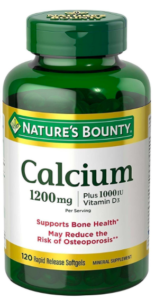
Nature’s Bounty Calcium provides the level of quality that has become a staple of this brand. The 600 mg of calcium in this supplement provided via slow-release is certainly optimal for many people, but it lacks zinc and magnesium placing it towards the bottom of our rankings.
The purity of the product, however, and its effective use of vitamin D help to compensate and make it a solid and reliable supplement nonetheless.
9. Solgar Calcium Citrate
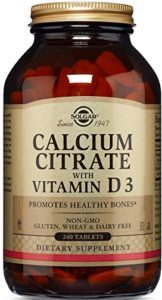
Solgar Calcium Citrate is a good choice for those who may prefer a basic approach to supplementation. It provides 200 mg of calcium with 100 mg of magnesium and 80 mg of vitamin D.
As the recommended dosage for calcium is 1000 mg per day, this may not be ideal for those who would prefer less frequent pill intake.
10. Sundown Calcium
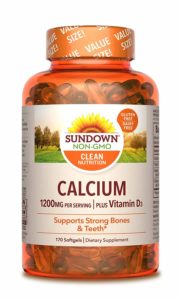
With 600 mg of calcium per capsule, Sundown mirrors some of our earlier slow-release formulation choices. While the dosage amount is ideal for many, it does lack both magnesium and zinc.
Absorption is boosted by its vitamin D3 content, however, so it still gives a decent base for a minimal price.
How We Rank
We first looked at which supplements and brands provided higher amounts of calcium per serving. As many calcium supplements require the need for several doses per day, it was important that options had more than 200 mg of calcium per serving, and ideally more than 250mg, like one of your top picks Amazing Natural’s; which had 1000mg of calcium per serving.
We also looked at which supplements had additional vitamins to increase absorbency and uptake. Calcium absorption has been linked previously to magnesium and vitamin D, so we focused on products, like New Chapter, that provided these in addition to calcium.
Vitamin D was the most heavily weighted of the absorption vitamins as it has been proven to be most effective in assisting with calcium absorbency. Supplements that excluded these were excluded. Unfortunately, this did remove popular brands such as Caltrate and BulkSupplements which only contain calcium.
We also reviewed the ingredients included in each supplement. Aside from the calcium and micronutrients, we wanted to choose supplements that had both healthy and safe formulations. We gave higher preferences to supplements that had a plant-based approach or opted for fewer fillers and binders when possible.
Supplements that had a simplistic or innovative approach were also ranked higher than others. Citracal, for example, was ranked highly due to its slow-release formula and its very few ingredients. Ultimately, brands with similar approaches and formulations were considered to be the better quality supplements among the sea of candidates. After all that we determined the top 10 best calcium supplements on the market.
Benefits
1. Calcium increases bone density and helps to maintain strong bone health. A 2014 study showed that calcium directly increases bone density and helps to maintain strong bone health (3).
Another older study conducted in 1997 also indicated a direct association between calcium and bone density. Researchers hypothesized that inadequate calcium intake was associated with a higher risk of osteoporosis in seniors. Individuals in the study took supplements over the course of 3 years.
The study concluded that those participants that took vitamin D and calcium supplementation had reduced bone loss in their spine and overall body (4).
Another study explored calcium supplementation and increases in bone density in children. Researchers discovered that calcium supplementation increased bone mineral density in children. Consequently, they were at a lower risk of fractures later in life (5).
2. Calcium can reduce the risk of fractures, especially in the elderly. In 2016 a meta-analysis published in osteoporosis international assessed the use of calcium in conjunction with Vitamin D to asses the preventative benefits against features. 30,970 patients demonstrated that calcium reduced the risk of fractures showing a 15% reduction of total fractures, with a 30% reduction in hip fractures specifically (6).
A 2009 review showed similar findings. It supported the conclusion of various studies and research showing that older women should increase their calcium intake to reduce their risk of fractures (7).
3. Calcium may help alleviate PMS symptoms. A 2015 study showed that women with premenstrual syndrome (PMS) had lower serum levels of calcium and magnesium (8).
As such, it is hypothesized that balancing these out via supplementation could help alleviate PMS symptoms, but more research is needed.
4. Calcium can help with fat loss. A 2011 study published in the Journal of the American College of Nutrition has demonstrated that calcium has weight loss effects by an increase in fat oxidation and fecal loss, as well as the facilitation of appetite control (9).
Another 2004 study published in the same journal showed that diets that include greater or equal to 3 daily servings of dairy products result in significant reductions in fat tissue mass in obese humans, even without dietary restrictions (10).
Dairy sources of calcium exert a significantly greater anti-obesity effect than supplemental sources in each of these studies. This is possibly due to the effects of other bioactive compounds on fat cell metabolism, indicating an important role for dairy products in the control of obesity (11, 12).
5. Calcium can reduce the risk of colon cancer. In a study done in Korea, calcium consumption showed it was inversely related to colon cancer risk, where the Korean national average calcium intake level is relatively lower than in Western countries. A decreased risk of colorectal cancer by calcium intake was observed in all subsites in men and women (13, 14).
Although many people believe it can reduce the risk of lung, breast, or other cancers, there isn’t enough conclusive evidence to support this fact pre or post diagnosis (15, 16).
For total calcium intake, each 300 mg/day increase was associated with an approximately 8% reduced risk of colon cancer (17).
APC/β-catenin pathway malfunction is a common and early event in colon cancer. A 2017 study showed that calcium supplements have shown to improve the pathway and reduce the risk of cancer (18).
6. Calcium can help lower blood pressure. In a survey of over 14,000 obese adults age 20 years or older, there was a clear inverse correlation between calcium intake and high blood pressure. This showed to be especially true for women (19).
A 2015 review showed that an increase in calcium intake slightly reduces both systolic and diastolic blood pressure, particularly in young people, suggesting a role in the prevention of hypertension (20, 21).
7. Calcium may help to increase testosterone in active individuals. In 2009 a four-week study was done involving the supplementation of calcium gluconate in active and sedentary males showed an increase in testosterone in the active group (22).
However, the calcium failed to increase testosterone in sedentary men relative to their own baseline.
8. Calcium supplementation during pregnancy can help reduce the risk of complications. A 1999 study published in The Australian and New Zealand Journal of Obstetrics and Gynaecology showed that 1.8g of calcium supplementation during the second half a woman’s pregnancy was correlated with fewer complications of preterm birth (23).
9. Calcium functions as a co-factor for various enzymes. Various studies show that calcium is a major factor in the creation and activation of specific enzymes necessary for normal functioning (24, 25).
10. Calcium helps muscles in the human body contract. When a message is sent to the muscles to contract, calcium ions are released. This release of calcium stimulates the contractile proteins. In other words, calcium controls muscular contraction. Without muscle contraction, the human body is unable to perform necessary movements and functions to lead an optimally healthy life (26).
11. Calcium supplementation may promote optimal dental health. A 2009 study explored the effects of calcium and vitamin D supplementation on dental health. Researchers included 51 subjects in their study.
These subjects were all receiving periodontal treatment, which is the treatment of the gums and structures surrounding and in the teeth. 23 of these participants took vitamin D and calcium supplements. Better improvements in dental health were noted in the subjects taking supplementation (27).
12. Calcium may help treat kidney stones and prevent kidney disease. A study from 1993 explored dietary calcium intake in relation to kidney stones. Researchers concluded that higher dietary calcium intake was associated with a decreased risk of kidney stones (28).
13. Calcium may help in the treatment of kidney stones and kidney disease. The kidneys provide the human body with multiple health benefits. Typically described as “bean-shaped” these organs placed on both sides of the spine are instrumental in filtering various impurities and water within the blood. When the kidneys do not work as planned, there are multiple consequences and possible issues that can arise.
Most commonly, kidney stones and kidney disease are seen when the kidneys have become unable to do their job properly. Calcium supplements can help to prevent the formation of both stones and disease due to their lowering of oxilation levels.
Too little calcium can cause oxalate levels to rise thus causing kidney stones. The consumption of calcium supplements in several studies has demonstrated that calcium supplementation is instrumental in maintaining these levels and avoiding disease and stone formation.
Though calcium citrate has been shown to help in the prevention of kidney stones and disease, those with a history of kidney stone formation should be cautious of supplement intake. Some studies have determined that calcium supplementation may increase the growth of kidney stones for those who have had chronic instances of this (29).
14. Calcium plays an important role in blood clotting. The human body has many elements that work in synergistic harmony to maintain balance and successful function. This is achieved through the use of cofactors. Cofactors are typically defined as “non-protein chemicals that assist with biological chemical reactions.”
Calcium has been identified as a cofactor in multiple instances, including blood clotting. Blood clots have the potential to be extremely dangerous if left unaddressed. In the case of deep-vein thrombosis (DVT), blood clots located in the deep veins of the body have the ability to break off from their original site and travel to additional areas of the body including the lungs which can be fatal.
Maintaining proper calcium levels can help to prevent the clotting process which could lead to this outcome.
Calcium ions in the blood function in tandem with vitamin K. Vitamin K is a cofactor as well that functions as an anti-coagulant. When combined with calcium ions in the blood, clots are unable to form in a way that would be detrimental to the human body. As multiple studies have demonstrated this link successfully, calcium intake is highly essential to maintaining healthy body function (30).
Side Effects
1. Calcium can cause IBS like symptoms in high dosages. Calcium can irritate the intestines and cause IBS like symptoms including bloating, diarrhea, constipation and abdominal pain (31).
2. Calcium may increase the risk of dementia. A 2016 study published in Neurology set out to determine whether calcium supplementation is associated with the development of dementia in women after a 5-year follow-up. It was found that elderly women taking calcium supplementation increased the chance of developing mixed and vascular dementia but not Alzheimer’s dementia (32).
3. Calcium can increase the risk of heart issues. Two meta-analyses involving 11 placebo-controlled trials found that calcium modestly increased the risk of strokes and heart attacks (33).
In another meta-analysis, calcium supplementation of equal to or great than 500 mg per day without co-administered vitamin D was linked with an increased risk of heart attacks (34).
4. Calcium and increase the risk of certain types of cancers. Studies show that consuming 2000mg/day (double the normal dose) has been associated with both an increase in prostate cancer and an increase in fatal prostate cancer (35).
This does not discriminate between supplementation and food, just the total amount of calcium.
5. Calcium can interact with certain medications. Administering intravenous ceftriaxone and calcium can result in life-threatening damage to the lungs and kidneys. Calcium should not be administered intravenously within 48 hours of intravenous ceftriaxone (36).
According to examine.com calcium can also reduce the efficacy of some antivirals (e.g., amprenavir and zalcitabine), aspirin, several antibiotics (e.g., several fluoroquinolones, tetracycline, and several cephalosporins), and some antifungals (e.g., ketoconazole) (37).
Calcium should never be taken in conjunction with thyroid replacement hormones such as levothyroxine as it hampered the absorption of the drug in the body.
6. Calcium overtime can lead to hypercalcemia. Hypercalcemia is when an individual has very high serum calcium levels; usually a result of long-term overdosing. Hypercalcemia has been associated with an increased risk of heart issues and even strokes (38).
This would take a high dose of >20g per day over a long period of time for many individuals however and is often not something to worry about.
7. Calcium supplementation can block other mineral absorption. A 2007 review published in Nutrition in Clinical Practice showed that too much calcium via diet or supplementation interfered with the proper absorption of other essential minerals including magnesium, zinc and phosphorous (39).
8. Calcium supplements may cause allergic reactions. While calcium itself is highly unlikely to cause an allergic reaction, the compounds included in calcium supplements may. Calcium supplements traditionally include multiple compounds and ingredients such as magnesium, zinc, and binders to maintain and stabilize formulations.
Those who have a history of sensitivity or intolerance should be cautious when choosing to begin calcium supplementation. In most cases, allergic reactions to compounds will be moderate and could include occurrences of nausea, dizziness, rashes, or hives. This can normally be addressed through over-the-counter antihistamines and are of minimal concern.
If an allergic reaction occurs in alignment with calcium supplementation. It is recommended that consumption cease and a physician be consulted as soon as possible. Those who have a history of allergic reactions are encouraged to consult a physician prior to beginning supplementation as well.
Recommended Dosage
For a normal adult, it is recommended to ingest around 1000mg of calcium per day (31).
However, it can increase up to 1300mg per day for the elderly and for women who are pregnant. This can be split up with supplements and food, or achieved from either one by itself. However, if you are taking supplements, make sure to take no more than 500mg at once and with vitamin D to ensure proper and adequate absorption (32).
Calcium supplements come in two main forms: calcium carbonate and calcium citrate. Calcium citrate is more expensive however it is more easily absorbed and less likely to cause side effects (33).
FAQ
Which foods are rich in calcium? The top 4 are seeds (including poppy, sesame and, chia), cheese, yogurt and fish like sardines and salmon.
Which form of calcium is better to take? Calcium supplements come in two main forms: calcium carbonate and calcium citrate. Calcium citrate is more expensive; however, it is more easily absorbed and less likely to cause side effects (34).
Is it better to take calcium in the morning or at night? Either is fine as there is no scientific evidence that proves one is better than the other.
How much calcium do I need per day? 1000 – 1200mg per day is the recommended dose.
Why does my calcium supplement contain vitamin D as well? Vitamin D helps with calcium absorption, and thus it is often a paired product in many calcium supplements.
What happens if you don t get enough calcium? When you’re chronically low in calcium, your bones and teeth begin to slowly deteriorate because your body is using its calcium stores to perform other functions, such as muscle contraction and forming new cell membranes. Poor blood clotting can also occur as a result.
Can you overdose on calcium? Getting too much calcium can cause constipation. It might also interfere with the body’s ability to absorb iron and zinc, but this effect is not well established. In adults, too much calcium (from dietary supplements but not food) might increase the risk of kidney stones.
What age does calcium loss generally begin? Most people will reach their peak bone mass between the ages of 25 and 30. By the time we reach age 40, however, we slowly begin to lose bone mass. We can, however, take steps to avoid severe bone loss over time.
Does taking calcium help with osteoporosis? Osteoporosis prevention begins during childhood and adolescence by getting enough exercise and the proper nutrients, including calcium and vitamin D. However, adults can help prevent osteoporosis in the same ways.
Is yogurt high in calcium? The main foods rich in calcium are dairy products like milk, cheese, and yogurt. However, many non-dairy sources are also high in this mineral.
Is coffee bad for bones? Studies show cola connection in women, but not men. Colas and coffee appear to have some effect on women’s bone density and could lead to osteoporosis.
Can calcium help with sleep? Yes, calcium is very useful in promoting healthy sleep cycles. As a cofactor, calcium helps the brain use an amino acid, tryptophan, to produce melatonin. Melatonin is released by the body to promote relaxation and restful sleep.
Is calcium safe to take during pregnancy? Yes, taking calcium during pregnancy is highly recommended. During pregnancy, there is an enhanced risk of nutrient and vitamin deficiency. Taking an adequate amount of calcium during pregnancy is beneficial to prevent long-term issues such as osteoporosis
Can calcium be taken while breastfeeding? Yes, calcium can be taken while breastfeeding. It is recommended that nursing mothers consume the recommended amount of calcium for their age group. There have been no known issues or concerns presented to support detrimental effects from calcium supplementation during this time
Is it better to take calcium supplements than get it through food? In general, it is recommended that calcium intake be obtained through food rather than supplements when possible. Though calcium supplements are considered to be safe, the natural compounds found within food sources tend to be better absorbed than those provided through supplementation. In the event, however, that enough calcium cannot be obtained through consumption, supplements are more than able to compensate.
Are calcium supplements safe for children? No, in most cases it is not recommended that children be given additional calcium supplementation. Children should generally be receiving their calcium intake through normal consumption. In the event supplementation is deemed necessary, it is important to consult a licensed pediatrician prior to beginning consumption
Who would benefit most from calcium supplements? In general, calcium supplementation should only be needed in cases where a deficiency or lower calcium levels have been identified. Calcium deficiency could increase with age and therefore those considered to be elderly may benefit greatly from extra amounts of calcium. Pregnant and nursing women are also encouraged to use calcium supplements when possible to avoid complications and maintain good health.
How should you choose a calcium supplement? Choosing calcium supplements should involve a great deal of research and review. Calcium supplements should include magnesium, zinc, or vitamin D respectively and should provide the recommended daily dosage for your recommended age group. Additional ingredients should be limited to necessary components. Users are encouraged to consult their physician for specific recommendations that may fit their particular needs.
What are the 4 types of calcium? The two main forms of calcium supplements are carbonate and citrate. Calcium carbonate is cheapest and therefore often a good first choice. Other forms of calcium in supplements include gluconate and lactate.
What is elemental calcium? Each type of calcium contains varying amounts of the mineral calcium — referred to as elemental calcium. Elemental calcium is key because it’s the actual amount of calcium in the supplement. It’s what your body absorbs for bone growth and other health benefits. Calcium carbonate contains 40 percent elemental calcium. Calcium citrate contains 21 percent elemental calcium. Calcium gluconate contains 9 percent elemental calcium. Calcium lactate contains 13 percent elemental calcium.
Which type of calcium causes side effects? Its different for each individual, however calcium carbonate is the most constipating. You may need to try a few different brands or types of calcium supplements to find one that you tolerate the best.
How does calcium come? Calcium supplements are available in a variety of forms, including tablets, capsules, chews, liquids and powders. If you have trouble swallowing pills, you may want a chewable or liquid calcium supplement.
Is calcium naturally found in the earth? Calcium is a mineral that is naturally found in the earth. It is found in the second group, alkaline earth metals, and the second period of the periodic table. It is considered a metal, and therefore can be found as a positive ion. These ions within the body are necessary to get signals to-and-from the brain. Since your body doesn’t produce calcium, so you have to rely on your diet (and supplements) to get the calcium you need.
Recap
Calcium is one of the most important nutrients to your overall health – so much so that your body will leech from your own bones if you aren’t getting enough. The daily requirement is around 1000mg and can be a combination of supplements and food. However it has been shown to that calcium coming from food is much better used and absorbed in the body – thus being the preferred method.
Calcium supplementation can cause some side effects mimicking IBS like symptoms and does not interact well with certain medications – especially those involved in thyroid replacement therapy. As with any mineral or nutrient, you should monitor your calcium intake so that you aren’t getting too much or too little.
For Healthtrends #1 calcium recommendation, click here.
